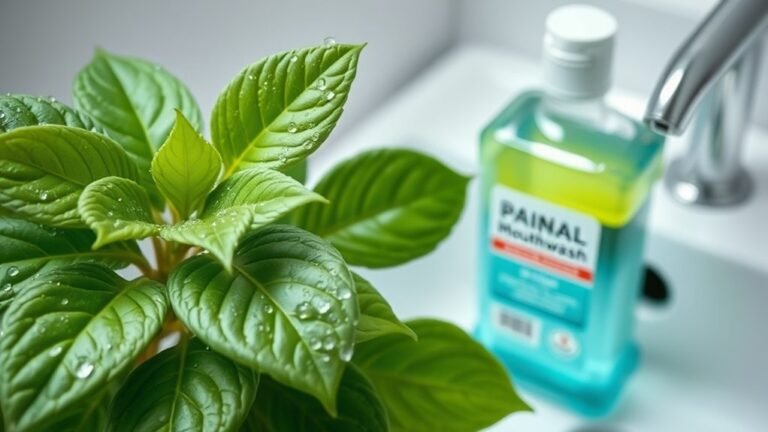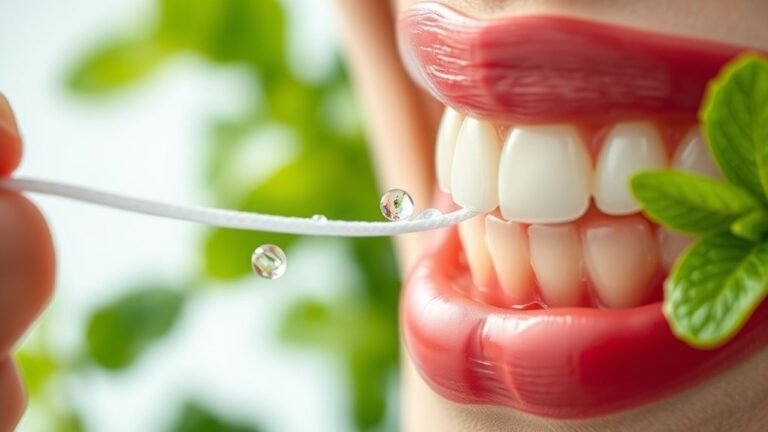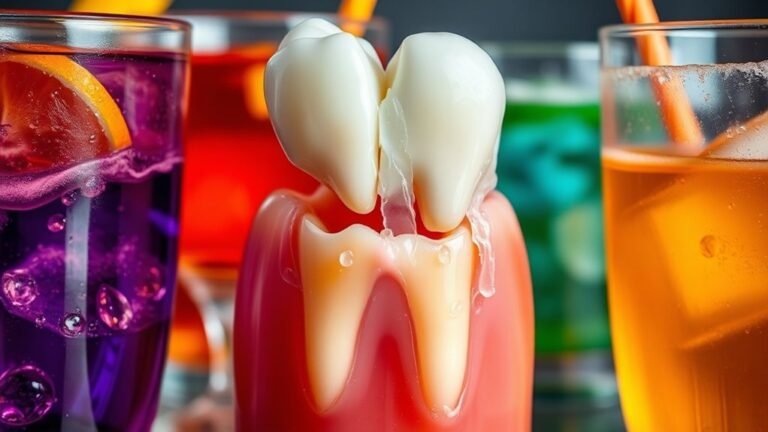How Do Smoking and Alcohol Worsen Oral Bacteria and Bad Breath
Smoking and alcohol disrupt your oral microbiome, promoting harmful bacteria that worsen bad breath. Smoking reduces blood flow to your gums, hindering healing and increasing gum disease risk. Alcohol leads to dry mouth, which fosters an acidic environment for harmful bacteria to thrive. Both substances decrease saliva production, allowing food particles and bacteria to accumulate. It’s essential to understand how these habits affect your oral health, and there are effective strategies to combat these issues.
Key Takeaways
- Smoking alters the oral microbiome, promoting harmful bacteria that contribute to bad breath and gum disease.
- Alcohol consumption leads to dry mouth, reducing saliva and allowing harmful bacteria to thrive, worsening bad breath.
- Nicotine promotes bacterial adhesion to teeth, increasing plaque formation and heightening bad breath risk.
- Both smoking and alcohol disrupt the mouth’s pH balance, fostering an acidic environment that exacerbates bacterial growth.
- Reduced blood flow from smoking impairs gum healing, increasing the likelihood of infections and chronic bad breath.
The Impact of Smoking on Oral Health
While many people overlook the link between smoking and oral health, the evidence is clear: smoking particularly harms your mouth. Research shows that smoking alters the composition of oral bacteria, leading to an imbalance that fosters harmful microbes. This disruption increases your risk of periodontal disease, tooth decay, and bad breath. In addition, smoking reduces blood flow to your gums, impairing healing and exacerbating infections. Studies indicate that smokers are more likely to experience gum disease than non-smokers, making it essential to understand this connection. By quitting smoking, you can restore a healthier oral microbiome, reduce inflammation, and considerably improve your overall oral health. The consequences of smoking on your mouth are profound, highlighting the importance of addressing this habit.
How Alcohol Consumption Affects the Mouth
When you consume alcohol, you may experience dry mouth, which can markedly impact your oral health. This dryness creates an environment that promotes bacterial growth, leading to potential infections and other complications. Additionally, alcohol can disrupt your mouth’s pH balance, further exacerbating these issues.
Dry Mouth Effects
Alcohol consumption markedly contributes to dry mouth, a condition known as xerostomia. When your mouth lacks adequate saliva, the dry mouth effects become evident, leading to an increased risk of oral health issues. Saliva plays a vital role in controlling oral cavity bacteria, as it helps wash away food particles and neutralizes acids produced by these bacteria. Without sufficient saliva, harmful bacteria can thrive, heightening the chances of tooth decay, gum disease, and persistent bad breath. Additionally, dry mouth can lead to difficulty in swallowing and speaking, further complicating your oral health. By understanding the implications of alcohol on saliva production, you’re better positioned to make informed choices regarding your consumption and its impact on your overall oral hygiene.
Bacterial Growth Promotion
Excessive alcohol consumption greatly alters the oral microbiome, creating an environment conducive to harmful bacterial growth. When you drink heavily, it can lead to a reduction in saliva production, which normally helps control bacterial levels. This imbalance allows pathogenic bacteria to thrive, exacerbating issues like halitosis. Studies show that alcohol can also impair your immune response in the mouth, making it harder for your body to combat these harmful bacteria. As these bacteria proliferate, they produce volatile sulfur compounds, directly contributing to bad breath. Essentially, frequent alcohol consumption not only promotes bacterial growth but also creates a vicious cycle of oral health issues, including persistent halitosis that can be challenging to manage effectively.
Ph Level Imbalance
While you might enjoy the effects of alcohol, it can notably disrupt the pH levels in your mouth. When you consume alcohol, it tends to create an acidic environment, which can lead to an imbalance in your oral microbiome. This imbalance fosters plaque buildup, as harmful bacteria thrive in acidic conditions. As the plaque accumulates, it can contribute to increased breath odor, making your mouth feel less fresh. Additionally, an acidic mouth can hinder saliva production, further exacerbating the problem by reducing your mouth’s natural ability to neutralize harmful bacteria. Consequently, regular alcohol consumption not only affects your overall oral health but also considerably impairs your breath quality, leading to potential embarrassment in social situations.
The Relationship Between Oral Microbiome and Bad Breath
Your oral microbiome plays an essential role in maintaining fresh breath, as it consists of various bacteria that can either contribute to or combat bad odors. Smoking and alcohol consumption disrupt this delicate balance, leading to an overgrowth of odor-producing bacteria. Understanding these interactions can help you address bad breath more effectively.
Oral Microbiome Overview
The oral microbiome plays a significant role in the development of bad breath, as a complex community of bacteria inhabits the mouth and influences overall oral health. Within this microbiome, certain breath odor bacteria, such as volatile sulfur compound-producing species, thrive, leading to unpleasant smells. When the balance of these bacteria is disrupted—due to poor oral hygiene, smoking, or alcohol use—harmful bacteria can proliferate, exacerbating bad breath. Additionally, the oral microbiome’s health impacts saliva production, which is essential for neutralizing acids and washing away food particles. As a result, maintaining a balanced oral microbiome is important not only for fresh breath but also for preventing dental issues. Regular oral care practices can help control breath odor bacteria and support a healthier microbiome.
Effects of Smoking
Smoking considerably alters the composition of the oral microbiome, increasing the presence of harmful bacteria that contribute to bad breath. This shift can lead to various oral health issues, including gum disease and oral infections. Here are some key effects of smoking on your oral health:
- Increased harmful bacteria levels
- Higher risk of gum disease
- Reduced saliva production
- Impaired healing of oral tissues
- Elevated chances of oral infections
These changes not only exacerbate bad breath but also deteriorate your overall oral health. By understanding the detrimental impact smoking has on your microbiome, you can take proactive steps to improve your oral hygiene and minimize bad breath. Quitting smoking is a vital step towards restoring balance in your oral environment.
Impact of Alcohol
While many people enjoy alcohol socially, its impact on the oral microbiome can be significant, leading to an increase in bad breath. Alcohol consumption alters the composition of oral bacteria, promoting the growth of harmful microbes that produce volatile sulfur compounds (VSCs). These compounds contribute to foul odors, which you may notice as bad breath. Additionally, alcohol can dry out your mouth, reducing saliva production. Saliva plays an essential role in washing away food particles and bacteria, so its decrease exacerbates bacterial growth. Regular alcohol consumption not only disrupts your oral balance but also creates an environment conducive to bad breath. By understanding this relationship, you can make informed choices about alcohol and its effects on your oral health.
The Role of Nicotine in Bacterial Growth
Nicotine, often overlooked in discussions about oral health, appreciably influences bacterial growth within the mouth. Its effects can severely compromise your dental hygiene and promote the formation of harmful bacterial biofilm. Here’s how nicotine affects bacteria:
- Alters the oral microbiome composition.
- Promotes bacterial adhesion to teeth and gums.
- Impairs immune response, making it harder for your body to fight infections.
- Increases the risk of periodontal disease.
- Contributes to persistent bad breath.
Alcohol’s Contribution to Dry Mouth
Alcohol consumption considerably contributes to dry mouth, a condition that can exacerbate oral health issues. When you drink alcohol, it acts as a diuretic, leading to dehydration and reduced saliva production. Saliva is essential for neutralizing acids and washing away food particles, so its absence can intensify breath odor causes. A dry mouth creates an environment where harmful bacteria thrive, further increasing the risk of bad breath and dental problems. Research shows that individuals with dry mouth are more likely to experience cavities and gum disease. Consequently, limiting alcohol intake is important for maintaining oral health and preventing the unpleasant consequences associated with dry mouth. Staying hydrated can also help mitigate these effects and promote better oral hygiene.
Common Oral Bacteria Associated With Smoking and Alcohol
Smoking and alcohol consumption greatly alter the oral microbiome, fostering the growth of certain harmful bacteria. These bacteria can lead to bad breath and increase the risk of bacterial infections.
Common oral bacteria associated with smoking and alcohol include:
- Porphyromonas gingivalis: Linked to gum disease.
- Fusobacterium nucleatum: Associated with bad breath and periodontal issues.
- Treponema denticola: Often found in individuals with chronic periodontitis.
- Streptococcus mutans: Contributes to tooth decay and bad breath.
- Prevotella intermedia: Commonly found in smokers, linked to inflammation.
Understanding these bacteria is essential for effective bad breath treatment. By recognizing their role, you can take steps to mitigate their impact and maintain better oral health.
Strategies for Reducing Bad Breath Linked to Smoking and Alcohol
When you’re trying to combat bad breath linked to smoking and alcohol, implementing targeted strategies can make a notable difference. Start with diligent dental care; brush and floss regularly to eliminate food particles and reduce plaque buildup. Using an antibacterial mouthwash can also help neutralize odor-causing bacteria. Incorporate breath freshening products, like sugar-free gum or mints, to stimulate saliva production, which naturally cleanses the mouth. Staying hydrated is essential; drink plenty of water to flush out toxins and reduce dry mouth, a common issue for smokers and drinkers. Finally, consider dietary adjustments—fruits and vegetables, particularly crunchy ones, can enhance oral hygiene and combat bad breath effectively. By adopting these strategies, you can notably improve your breath and overall oral health.
The Importance of Regular Dental Check-ups for Smokers and Drinkers
Regular dental check-ups are essential for maintaining oral health, especially if you smoke or drink, as both habits greatly increase the risk of dental issues. Regular visits help you manage the heightened risks of chronic halitosis and other complications. Here’s why you shouldn’t skip them:
Regular dental check-ups are crucial for those who smoke or drink to prevent serious oral health issues.
- Detect early signs of gum disease
- Receive professional dental cleaning to remove plaque and tartar
- Monitor oral cancer risks associated with smoking
- Address bad breath linked to alcohol consumption
- Get tailored advice for improving oral hygiene
Frequently Asked Questions
Can Smoking Lead to Gum Disease and Worsen Bad Breath?
Yes, smoking can lead to gum disease and worsen bad breath. It reduces blood flow to gums, impairs healing, and promotes harmful bacteria growth, contributing to inflammation and persistent oral odor.
How Does Alcohol Affect the Healing of Oral Tissues?
Alcohol impairs healing by reducing blood flow and nutrient delivery to oral tissues. It can also dehydrate mucous membranes, increasing inflammation and delaying recovery. Consequently, your oral tissues struggle to repair effectively after injury or surgery.
What Are the Best Mouthwashes for Smokers and Drinkers?
Studies show 70% of smokers have gum disease. To combat this, use mouthwashes containing chlorhexidine or cetylpyridinium chloride. These ingredients effectively reduce bacteria and help maintain oral hygiene, essential for smokers and drinkers alike.
Does Quitting Smoking Improve Breath Immediately?
Yes, quitting smoking can improve your breath almost immediately. Research shows that within days, your mouth’s natural balance improves, reducing harmful bacteria and enhancing overall oral health, leading to fresher breath and a cleaner mouth.
Are There Specific Foods That Help Combat Bad Breath From Alcohol?
Yes, crunchy fruits like apples and vegetables such as celery can help combat bad breath from alcohol. They stimulate saliva, which naturally cleanses your mouth, contrasting with the dryness that alcohol creates.
Conclusion
In the battle against bad breath, you can’t ignore the impact of smoking and alcohol. As the saying goes, “you are what you eat,” and what you consume affects your oral microbiome. Smoking introduces harmful bacteria while alcohol can dry out your mouth, exacerbating the issue. To combat these effects, prioritize good oral hygiene, stay hydrated, and keep up with regular dental check-ups. By doing so, you can maintain a healthier mouth and fresher breath.






